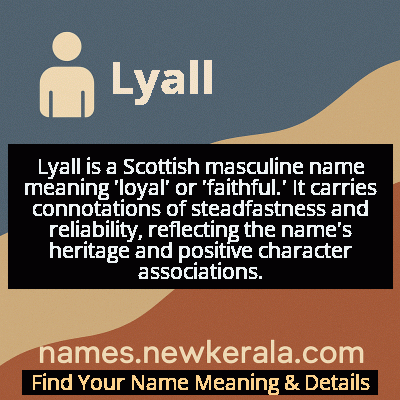Lyall Name Meaning & Details
Origin, Popularity, Numerology Analysis & Name Meaning of Lyall
Discover the origin, meaning, and cultural significance of the name LYALL. Delve into its historical roots and explore the lasting impact it has had on communities and traditions.
Name
Lyall
Gender
Male
Origin
Scottish
Lucky Number
8
Meaning of the Name - Lyall
Lyall is a Scottish masculine name meaning 'loyal' or 'faithful.' It carries connotations of steadfastness and reliability, reflecting the name's heritage and positive character associations.
Lyall - Complete Numerology Analysis
Your Numerology Number
Based on Pythagorean Numerology System
Ruling Planet
Saturn
Positive Nature
Ambitious, efficient, realistic, and authoritative.
Negative Traits
Materialistic, stressed, confrontational, and can be overly ambitious.
Lucky Colours
Dark blue, black.
Lucky Days
Saturday.
Lucky Stones
Blue sapphire, amethyst.
Harmony Numbers
2, 4, 6.
Best Suited Professions
Business leaders, managers, financial services, law enforcement.
What People Like About You
Leadership, determination, organizational skills.
Famous People Named Lyall
Sir Andrew Lyall
Legal Scholar
Renowned professor of property law at Trinity College Dublin and influential legal author
William Lyall
Philosopher
Scottish philosopher and professor at University of Glasgow, known for his work on intuition and consciousness
David Lyall
Botanist and Surgeon
Scottish botanist who accompanied James Clark Ross's Antarctic expedition and discovered numerous plant species
Robert Lyall
Botanist and Diplomat
Scottish botanist who became the first British consul to Madagascar
Name Variations & International Equivalents
Click on blue names to explore their detailed meanings. Gray names with will be available soon.
Cultural & Historical Significance
Throughout Scottish history, bearers of the Lyall name have been noted for their contributions to academia, exploration, and public service, embodying the Scottish values of integrity and perseverance. The name's evolution from a Norse personal name to a Scottish surname illustrates the cultural exchanges that shaped Scottish identity over centuries. In the 19th century, many Lyalls emigrated from Scotland, spreading the name throughout the British Empire and establishing new branches in Canada, Australia, and New Zealand, where it continues to signify Scottish heritage and the values of loyalty and reliability.
Extended Personality Analysis
Individuals named Lyall are typically perceived as dependable, principled, and deeply committed to their values and relationships. The name's meaning of 'loyal' often manifests in personality traits such as steadfastness, reliability, and a strong sense of duty. Lyalls are often seen as the anchors in their social circles—people who remember important dates, keep confidences, and stand by their friends and family through difficult times. They tend to be methodical thinkers who value tradition and consistency.
This loyalty extends beyond personal relationships to professional and community commitments. Lyalls are often respected for their integrity and their ability to follow through on promises. While they may appear reserved initially, those who earn a Lyall's friendship discover a deeply caring individual with a dry wit and sharp intellect. The name's Norse wolf origins also suggest an underlying strength and resilience, making Lyalls capable of handling challenges with quiet determination. They balance their strong sense of responsibility with an independent spirit, creating individuals who are both reliable team players and self-sufficient problem solvers.
Modern Usage & Popularity
In contemporary times, Lyall remains primarily a surname but has seen increasing use as a distinctive masculine given name, particularly in Scotland and among Scottish diaspora communities. While not among the most popular names, it has maintained a steady presence, often chosen by parents seeking a name with strong Scottish heritage and meaningful symbolism. The name enjoys particular popularity in Canada, Australia, and New Zealand, countries with significant Scottish immigration history. Recent years have seen a modest revival of traditional Scottish names, benefiting Lyall's usage. It appeals to modern parents looking for names that are both uncommon yet familiar, with a clear positive meaning and cultural depth. The name's usage patterns show it's most popular among educated, middle-class families who value heritage names with substantive meanings.
Symbolic & Spiritual Meanings
Symbolically, Lyall represents fidelity, strength, and ancestral connection. The name carries the dual symbolism of the wolf from its Norse roots—representing intelligence, family loyalty, and survival instincts—combined with the Scottish interpretation of steadfast faithfulness. This creates a powerful symbolic blend of wild independence and social commitment. In metaphorical terms, Lyall symbolizes the bridge between individual strength and community responsibility, the balance between personal freedom and relational fidelity. The name also carries connotations of heritage and continuity, representing the passing down of values through generations. It embodies the idea that true strength lies not in domination but in reliable partnership and unwavering support for one's community and principles, making it a name that symbolizes both personal integrity and social cohesion.

